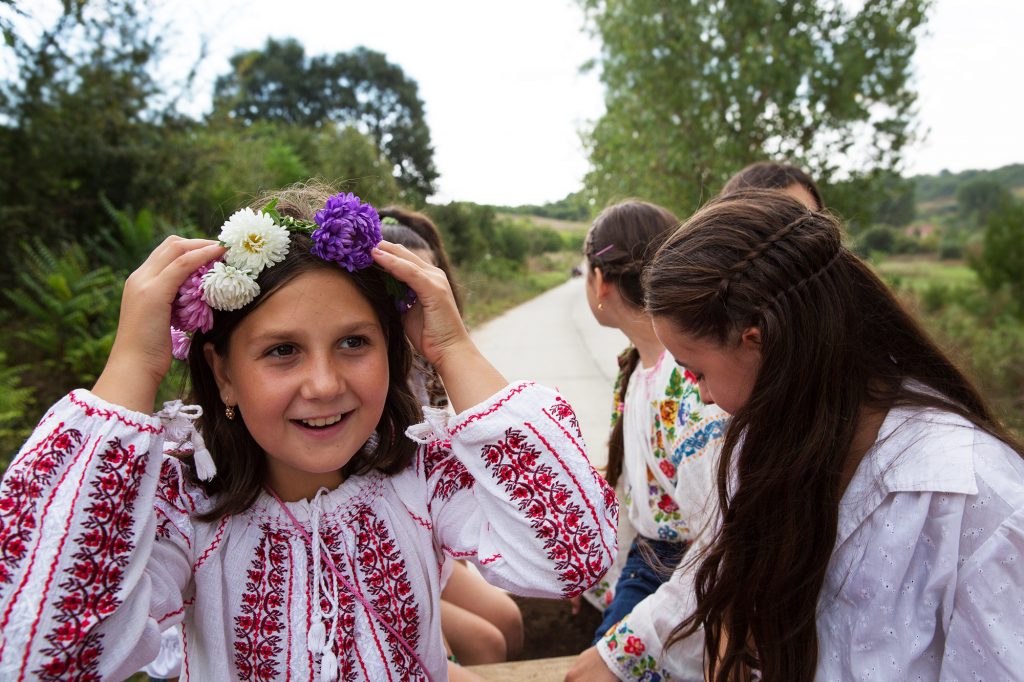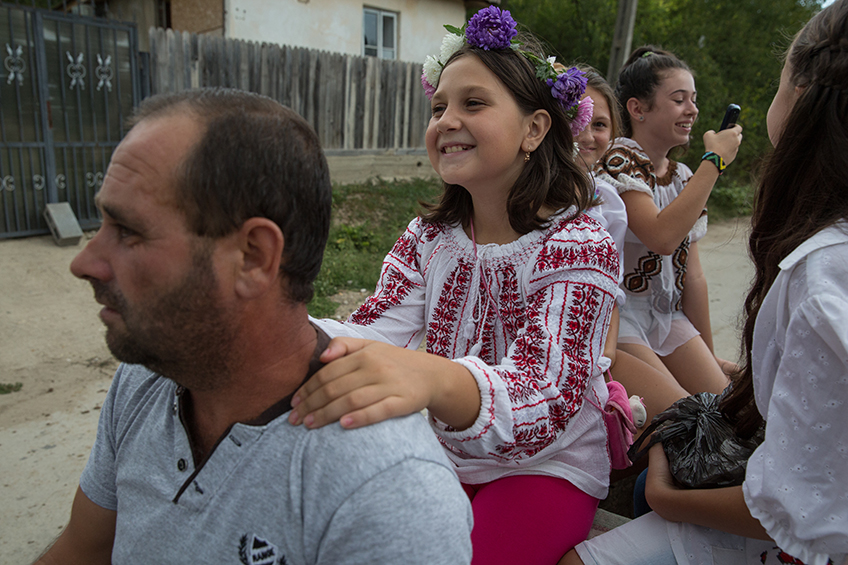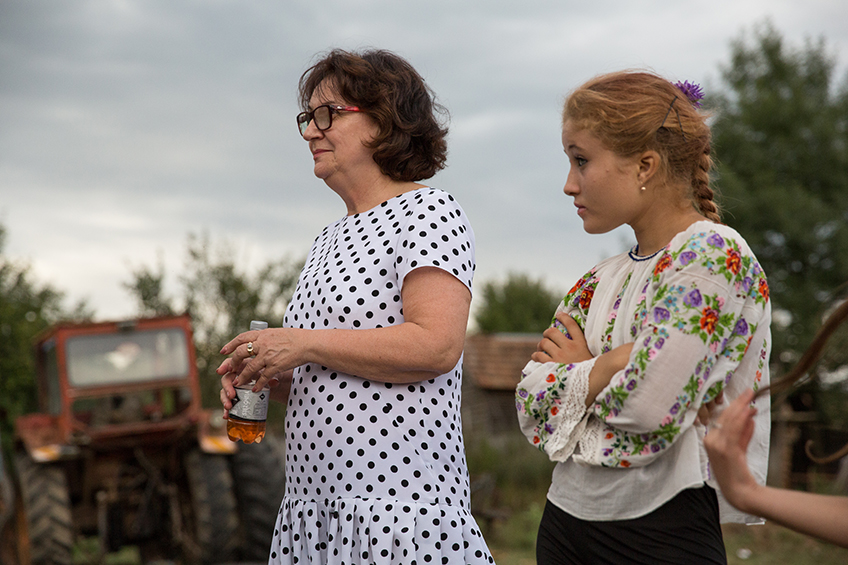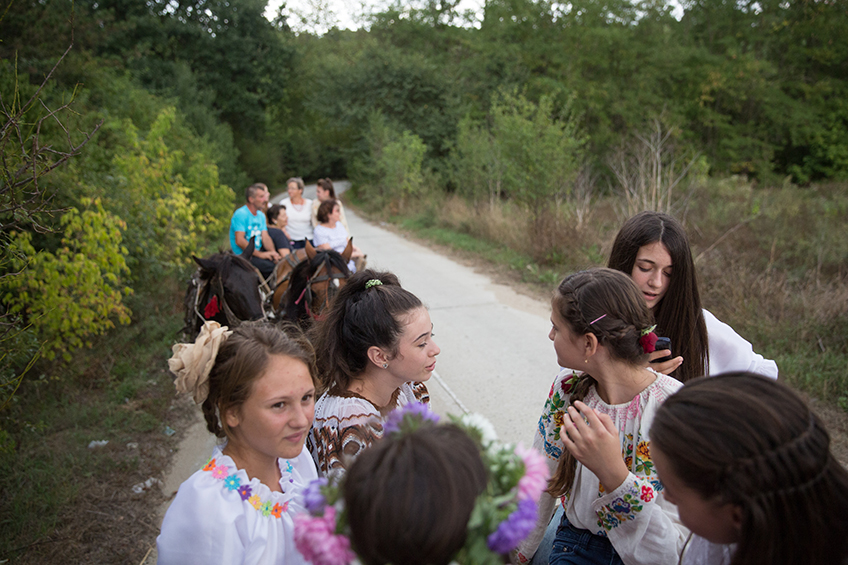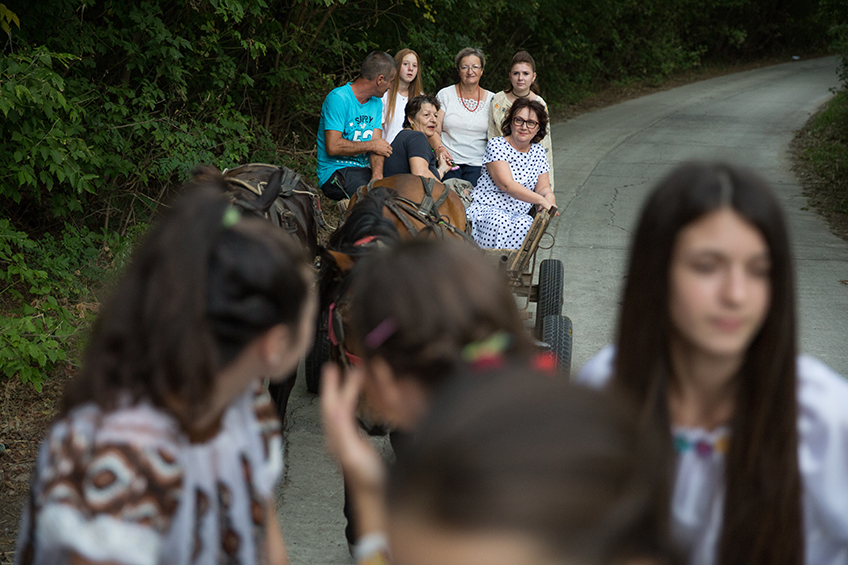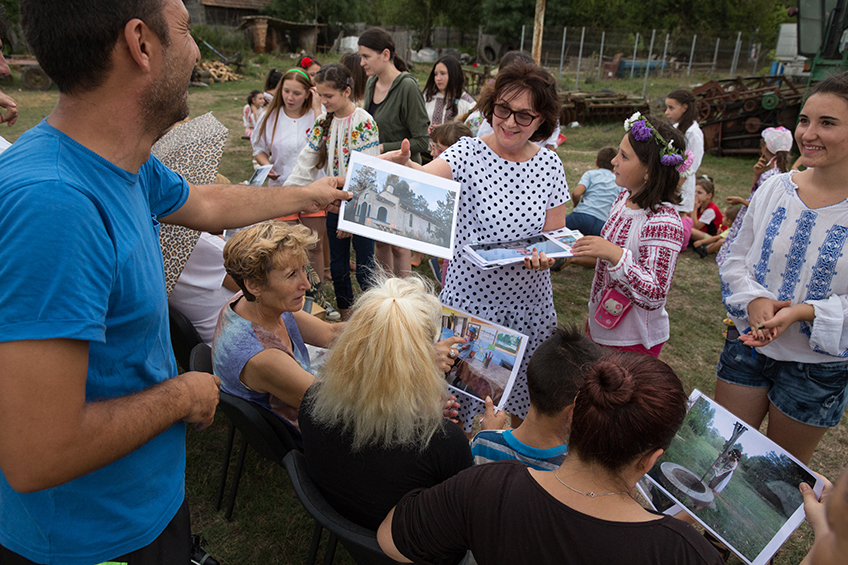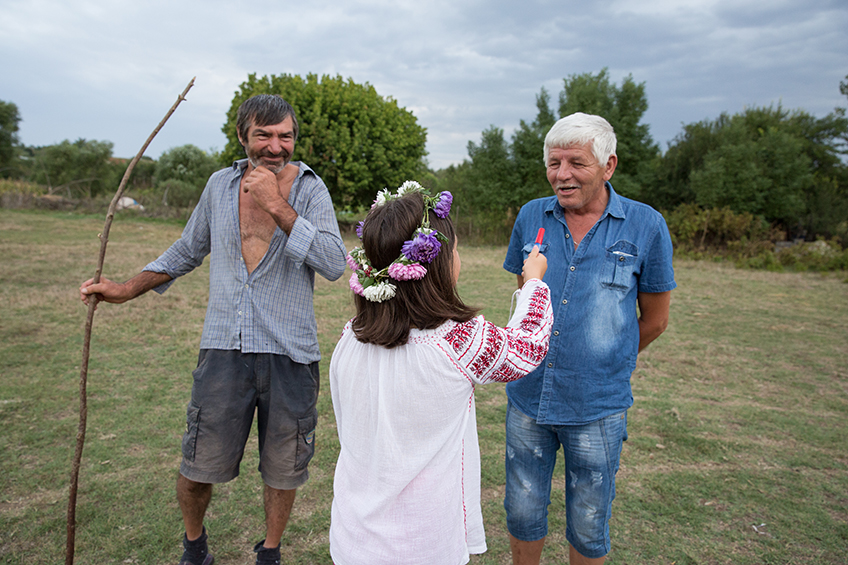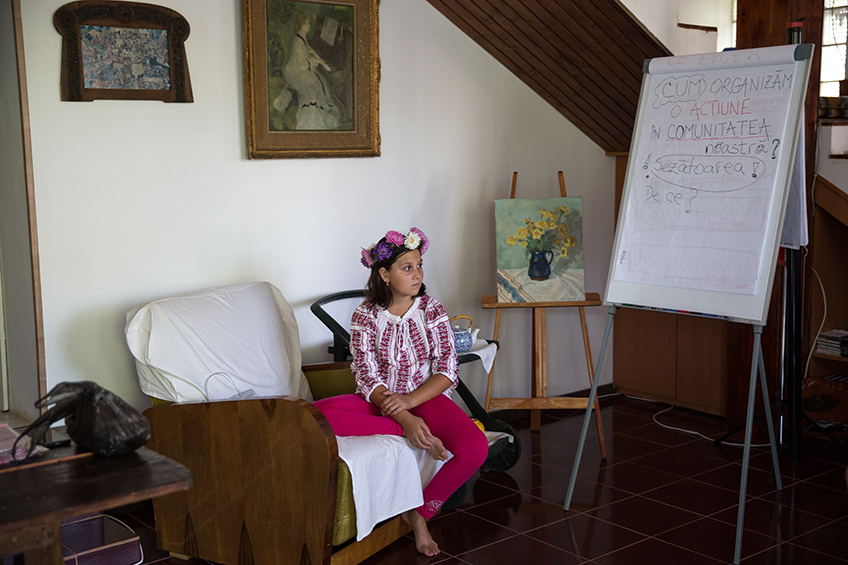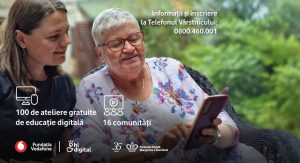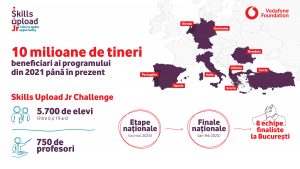How Rodica Mixich marked the development of several teenagers in a commune of Dolj County.
by Gabriela Pițurlea
A violin quietly playing in the background from the speakers, while the light of noon from the first April Saturday generously enters the living room of Rodica Mixich. 14 girls, aged 11-18 chat and wander around in slippers, and Rodica asks them to be quieter. She has a game for them. „We hang a piece of paper on the back of each of you and you walk to each other. When I say “onion”, you write the other person’s flaw. But think carefully. Seriously and thoroughly. When I say „orange”, you think of that person’s best feature.” The rush begins the next second and the girls pin the paper sheets on their clothes, with clothespins. Then, with markers in their hands, they stand in line, one behind the other. Protected by anonymity, the features start to roll: beautiful, smart, kind, beautiful eyes, honest, lonely, mean, messy, lazy, insecure.
This noise has been very usual in Rodica’s living room, for the past five years, since she first opened her door to several teenagers from Vârvoru de Jos Commune and created „The House for Culture”.
Rodica was born in 1951, in Hunedoara, graduated from the medical university in Cluj, where she also met her husband. In 1992, they got a two bedroom timber house, in Vârvor Village, with the idea of turning it into a weekend home. They had been living in Craiova for 12 years and raised their son there, but they were still missing the Transylvanian hills. They found Vârvor, which stands up unexpectedly, 26 km away from Craiova, at the edge of the Bucovăț forest. „It was like a little house of joy, but at a certain point, the space became insufficient”, Rodica says. Wanting a more welcoming space, they built a larger home next to the old one.
During this time, Rodica got to know her neighbours and understand the region’s specifics. She lived intensely the disappointment of a democracy she deeply wanted and which had proven to be an illusion and she started to ask herself more and more frequently „What can I do?”. „This was the naked truth,” she claims. „We turned from riot to volunteering. (…) This is what Nelson Mandela says, that education is the weapon you use, the one which will most certainly change the world. I also started from this idea. I cannot make big things, as I am lacking the financial capacity, I don’t have the tools to literally change [things], but you know what I’ll do? I’ll take a group of children from the countryside, I’ll start educating them and they will be different.”
Without having a plan or thinking seriously about her resources, she asked the mayor in function at the time to recommend her four girls. She started by passing on to them certain essential values: to avoid fighting, cursing, to share everything and then the activities constantly diversified. They talk about music and painting, but also about boys, now that many of them are teenagers. She brings books and insists that they read them. They even organized a competition „who can recite the most stanzas from Luceafărul”, and Cristina, who memorized 36 stanzas, won a pair of rollerblades. They celebrate Christmas together, and during the summer they go on trips, even if only for one day. Throughout the years, Rodica met people from various fields, willing to work with the girls as volunteers: actors, dance trainers, artisans. She asked her acquaintances to help, but felt that many of them got involved only by courtesy, as they did not seem to understand why she chose to do this. Even her husband was a little reserved regarding the initiative, Rodica says, but he supported her and, for instance, he gives the girls rides to the villages where they live.
Until she managed to explain to people that children were learning there how to behave, the villagers thought that agriculture was taught at Rodica’s house. The girls’ parents kept the distance, she says, as they came once or twice to festivities, but other than that, they showed no interest or concern regarding their children’s activities.
The group increased naturally – the girls were asking each other what was going on at the House for Culture and started to bring each other there. „We are like celebrities,” says one of the girls, referring to how they are seen in school. Rodica laughs about their statute in the commune, saying that she created a kind of boarding school. There’s a total of 15 girls and they come to the House every second weekend, because these are the Mixich family’s possibilities. There are no boys involved, as Rodica doesn’t think she could deal with young boys, as they are sometimes violent.
Loredana, one of the first to come to the House, is in 12th grade now, and still attends the meetings in Vârvor. Iuliana, who’s in 10th grade, does the same. Rodica thinks they keep coming back to the white, familiar and homely house, because they find something that they are missing in Craiova, where they go to high school.
The village has a community centre, but it’s deserted most of the times*, Rodica claims. The employees from the school in the commune did not offer to help her with the activities for the House of Culture, so, all these years, she has mostly relied on her acquaintances from the city. She also found support in the Rotary Craiova Club, which contributed with advice and small donations, such as books for children and teenagers. A locally known businessman brings to the meetings at the House of Culture a 4th grader called Ana, who lives with her mother and brother in a cottage, next to Craiova’s landfill, and whom he helped continue her education.
The girls from Vârvoru don’t face the problems that Ana has. It’s hard sometimes, Rodica says, as you have to explain to people who come over and see that they are properly dressed, educated, with mobile phones, that they are actually from underprivileged families. That most of their parents have no professional skills and work as day labourers wherever they can find work or leave to work in Italy, Spain or England.
***
After four and a half years of supporting the development of the House for Culture from her own resources, in 2015, Rodica wanted to apply for funding, just to see what it’s like. The five month project, drafted for the Foundations PACT and Vodafone România, has had an artistic component – the 15 girls received cameras and learned to take pictures – and a community component – they tried to prove to the villagers that there are still values and crafts worth being passed on and to highlight these through their photos. They took pictures of the only horseshoer in the village, of a 16th century church, grandparents, nature, friends.
In August, they also organized a county fair. They dressed in the traditional shirts that Rodica taught them to love, they crossed the village in two carriages and, in order to tone down the frowning and confusion, they greeted everyone they met on their way. They then stopped on a former football field nearby, where they hung the photos they had taken during the project on ropes. The visitors were few though. Not even the parents were there, and few people were curious enough to follow the carriages.
„It’s hard to bring a community together,” Rodica says. Even if the villagers were not as open – some are convinced that the older generation has nothing to pass on to the younger one, others seem to be too busy to engage in a dialogue – the project has changed the girls, she thinks, turning them into active citizens, who take interest in their community and what it can provide.
***
Around 3 o’clock, some of the girls gather around a map and point to Italian cities on it. „There, near Napoli, there’s Pompei. Look for Pompei,” Rodica tells them. „Yes, madam, I was there,” Alexandra says. „And what did you see there?” „I also saw the Etna volcano…” Rodica tells Cristiana, who also lived in Italy for three years, to thoroughly start learning the language. „Does anyone have the salsa phone?,” she asks and then asks those who already know the steps to help those who want to learn. The noise recommences and then becomes rhythmic. „One, two, three – five, six, seven. One, two, three – five, six, seven.”, the dance steps are counted, in a corner of the room. At the same time, at the window, Lori braids the girls’ hair. She moves fast, with confident movements, she leaves only content smiles behind along, of course, with several photos taken with their phones.
*During the last Wednesday in April, the girls organized an event at the community centre, the first out of a series of events where they will try to teach the children in the village what they have learned at Rodica’s house.
This material was drafted in partnership with Decât o Revistă within the funding round Involved in My Community, which is part of the Investment Program for the Rural Area, conducted by the Vodafone România Foundation and the PACT Foundation. You can find more stories of involvement on the platform oameniisudului.com developed by the PACT Foundation.

